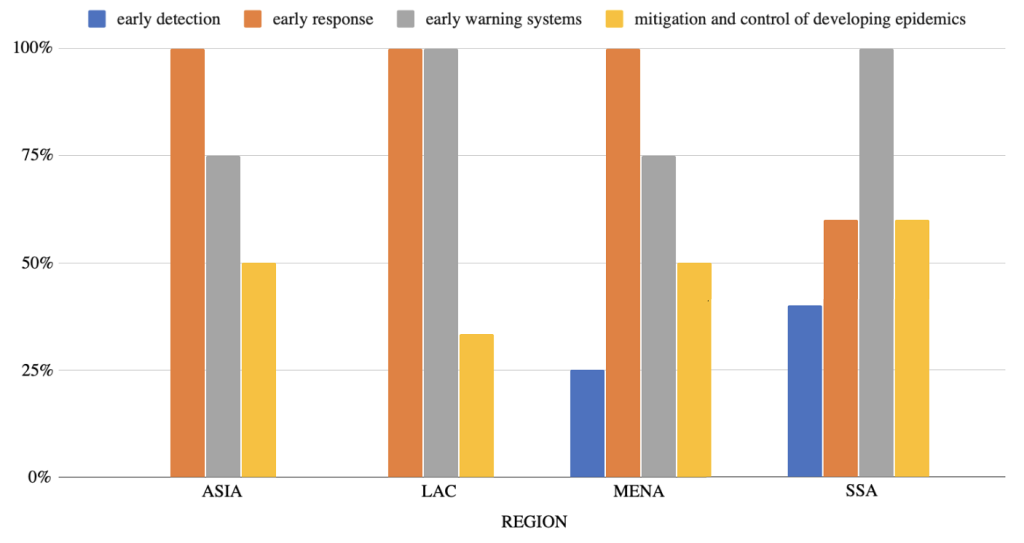Our Projects
Conceptual Framework
The Foundation of our projects is a combination of SDG3 (“Good Health and Well-being”) and SDG5 (“Gender Equality”). They are built around four research themes: early detection, early warning systems, early response, and mitigation and control of developing epidemics with AI being the entry point. See figure below for the thematic distribution over different regions. These four areas will be supported by three pillars: i) timely and reliable data for public health decision-making, ii) resilient, strong, and fair health systems and iii) inclusion and equity for vulnerable groups. One Health is the unifying approach that integrates and combines all these domains (themes and objectives to achieve), that are usually siloed.
Under Theme 1, our researchers are employing AI-based techniques to a) classify spillover dynamics and b) assess the role of interventions, incorporating gender, equity, inclusion and decolonization, social determinants of health, and responsible AI
Under Theme 2, our researchers are employing AI-based techniques a) for coordinated surveillance of early warning signals; b) o determine the characteristic structure of early warning signals. c) to evaluate early warning signals d) to study the cost-benefit analysis of early warning systems e)to investigate the likelihood of disease establishment
Under Theme 3, our researchers are a) employing AI-based techniques to evaluate successful non-pharmaceutical interventions (NPI), policy strategies in past outbreaks; b) improving AI-based models of human behaviour; c) employing AI-based techniques to investigate NPI effectiveness; and, d) employing AI-based techniques to improve utilization of Digital Contact Tracing
Under Theme 4, our researchers are a) deploying AI to inform vaccination roll-out strategies; b) designing AI-based models for antimicrobials and pathogen evolution; c) employing AI to monitor progress towards control or eradication.
Community engagement
Community engagement is central to mitigating emerging and re-emerging infectious disease outbreaks. Engaging stakeholders in clinical public health research can help ensure that both the design and implementation of research take into account the needs and priorities of marginalized communities. We are working with affected communities to improve our understanding of community factors impacting clinical public health metrics and gain insight into approaches for community-relevant modeling. We are working to advance community control over the community-owned, community-level data by offering insight into disease levels in real-time.
We are developing community-based response tools that will enable faster, more appropriate community-level responses to emerging risks. For many vulnerable community members, access to community-level information via the community improves trust as compared to non-community data and public health measures that are often detached and authoritarian.
Engagement with Decision Makers through Our Strategic Working Group
The added value of the body of new knowledge and innovations to be generated by the network research resides in its ability to inform effective policy options based on careful assessment, review of information, data, and input by stakeholders for validation.
The Network has created Global South AI4PEP Working Group on AI and One Health for public health as the ‘driving engine’ for Translating Research to Innovations, Strategies, and Evidence for policy options in the Global South
Embedding Gender, Equity , Inclusion and Decolonization (GEID)
We have embedded GEID priorities into our program’s goals, methods, governance, and implementation plan. Our program focuses on gender equity, diversity, inclusion, and decolonization, as well as intersectionality in all components since many of the root causes of current and ongoing systemic risks, originate from structural inequities, and a lack of diversity and inclusion in research, decision and policy-making processes. The transformation that this proposal focuses on cannot emerge without special and heightened attention to GEID entry points
